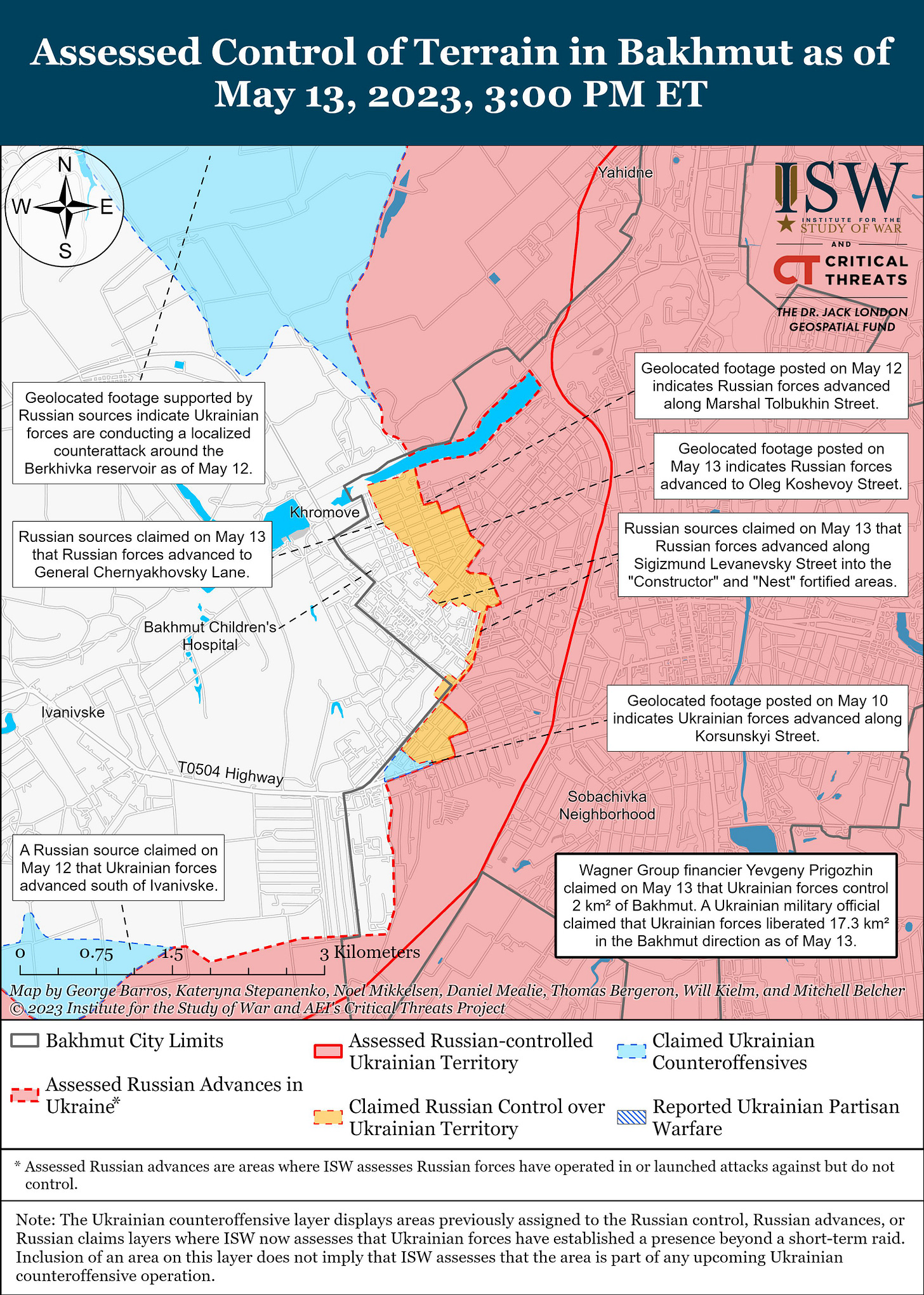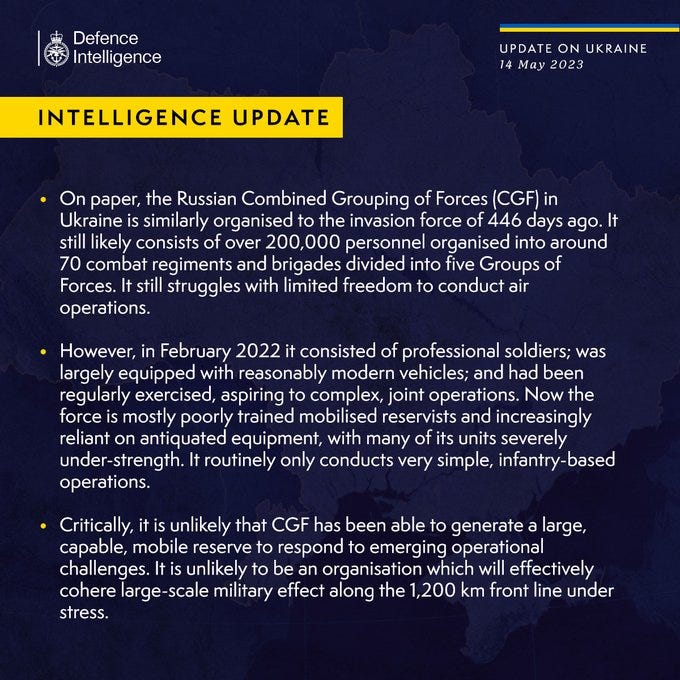May 15: E-Stories
Day 446: Zapo Dnipro Kharkiv Kherson Sumy UAgains RUplanes Luhansk Dzhelyal Murmansk Kuleba Ze-Scholz TurkeyElex A&P Avdeeva ISW UKDef Junisbai Yermak Browder Davis Harrison O'Brien Zaluzhny SpyMuseum
Catching up…
EA Worldview’s Ukraine Up-date- hop over to Scott’s amazing hourly Ukraine up-date page. I’ll fill in with some bits and bobs.
Before reading: EuroFile will not publish rumours—once information has been vetted and confirmed, then it’s a go. Rumours abound, especially now, and serve as distractions or part of an information operation.
Sorry for the delay…we were waiting for the latest from Turkey.
Ternopil has been attacked a second time, the Ukraine State Emergency Service has said. Rescuers extinguished the fire all night after the russian cruise missile attacks. After the first attack, Tvorchi said:
Ternopil is the name of our hometown, which was bombed by Russia while we sang on the Eurovision stage about our steel hearts, indomitability and will.
This is a message for all cities of Ukraine that are shelled every day.
Kharkiv, Dnipro, Khmelnytskyi, Kyiv, Zaporizhzhia, Uman, Sumy, Poltava, Vinnytsia, Odesa, Mykolaiv, Chernihiv, Kherson and all others.
Europe, unite against evil for the sake of peace. Glory to Ukraine.
Stories we’re following…
Military: Ukrainian forces capture more than 10 positions near Bakhmut. Ukrainian forces have retaken more than 10 Russian-held positions on the northern and southern outskirts of Bakhmut, Deputy Defense Minister Hanna Maliar said on May 14.
On Sunday, 14 May, Russian forces conducted unsuccessful offensive operations on the Kupiansk front. Ukrainian forces also repelled numerous Russian assaults near Marinka. Fighting for the city of Bakhmut continues, reports General Staff of the Armed Forces of Ukraine on Facebook.
Russian forces conducted six missile strikes, targeting the city of Kharkiv and the village of Zolochiv, among other settlements. Russian forces also carried out 27 airstrikes and deployed multiple-launch rocket systems (MLRS) to conduct around 20 attacks on positions of Ukrainian forces and civilian settlements.
Ukrainian Air Force downs 25 Russian drones, 3 missiles early Sunday morning. Air defense downed 18 Iranian-made Shahed drones, one Lancet drone, two Orlan-10, four unspecified drones, and three cruise missiles, Ukraine's Air Force reported.
As a result of shelling by the Russians, two civilians died in the village of Starytsa, Kharkiv Oblast, reports Oleh Syniehubov, head of the Kharkiv Oblast State Administration, on Telegram on May 14. These are peaceful villages on the front. The Russian forces also shelled Zaporizhzhia and Dnipropetrovsk oblasts.
Explosions reported in Kherson, Sumy oblasts as air raid sirens spread across Ukraine. Local Telegram channels reported explosions in Kherson and Sumy oblasts overnight on Sunday.
Analysts at the Institute for the Study of War (ISW) have reported that, according to their data, the Ukrainian military liberated 16.85 square kilometres on the Bakhmut front during their recent counterattacks.
Overall, the situation is deteriorating for Russian troops as the "Wagner" PMC detachments are gradually being replaced by motorized rifle and airborne units staffed with poorly trained and unmotivated personnel, mostly personnel called up for mobilization.
CDS reports that the Russian military will continue its efforts to capture Bakhmut, will gradually move to the defense in the Lyman, Bakhmut, Avdiivka and Maryinka directions, and will continue the offensive operation to capture Kupyansk, which can be launched simultaneously with the start of the counteroffensive of the Ukrainian Defense Forces.
According to Russian media, four Russian aircraft, two helicopters, and two fighter jets crashed in the Russian Bryansk Oblast bordering the north of Ukraine on Saturday, April 13. The crew of one of the helicopters was confirmed dead. The Russian media speculate that the helicopters and the planes were shot down by Ukrainian anti-aircraft guns using the recently provided Western long-range systems.
The UK Ministry of Defence said Russian forces were much diminished since the start of the war with troops consisting of mostly poorly trained mobilised reservists and increasingly reliant on antiquated equipment, with many of its units severely under-strength.
In occupied Luhansk and Zaporizhzhia regions, camps are being created for the training of prisoners arriving from the Russian Federation. The Russian armed forces continue to try to replenish its losses in manpower. The arrival of about 200 such people to one of the enemy’s field camps in the temporarily occupied Rogovy of Luhansk region was noted. Up to 250 convicts are expected to arrive by the end of the month.
Fifty representatives of the Investigative Committee of the Russian Federation are conducting humiliating and abusive interrogations of civilians in the Russian-occupied southern city of Mariupol, as reported on Facebook by the General Staff of the Armed Forces of Ukraine. The General Staff also reported that Russian occupation forces are continuing to use civilian healthcare facilities in temporarily occupied cities and towns to treat injured Russian military personnel.
The health of Nariman Dzhelyal, one of the leaders of the Crimean Tatar People who was sentenced to 17 years in prison by a Russian occupation court for reportedly committing sabotage, has deteriorated due to harsh prison conditions. According to his wife, he is suffering from three herniated discs, and although it is difficult for him to sit and stand, he is not allowed to lie down during the day.
Past attempts to curb Russian TV’s presence in Kazakhstan have failed after furious pushback from Moscow. The task is both delicate and dangerous. Yet, allowing crazed propaganda from a decaying empire to dominate the airwaves in Kazakhstan is akin to ingesting poison daily.
In Murmansk, on the night of May 14, the regional military registration and enlistment office caught fire. Shamil Aliyev-Gasanov was detained on suspicion of arson. He told the police that he really set the fire, but not out of conviction, but because he was blackmailed.
The head of Russia’s federal crime agency, Alexander Bastrykin, suggested that key sectors of the economy should be nationalised to support Moscow’s war in Ukraine. “We are essentially talking about economic security in a war,” he told a conference that was streamed online. “Let’s go along the path of nationalising the main sectors of our economy.”
Talked about ensuring unity and support Ukraine in confronting Russian aggression during the meeting of the Group of Seven, which will take place in the middle of May in the Japanese city of Hiroshima.
Ukraine’s victory is the return of our territories, security guarantees and NATO membership. We must become even stronger so that RF has no chance to come back. We must destroy RF's economy with sanctions and make them pay for all their crimes. War criminals will be in The Hague.
Foreign Minister Dmytro Kuleba said on May 13 that he spoke with U.S. Secretary of State Antony Blinken to coordinate the next weapon supplies to Ukraine, with "close attention" to the importance of providing F-16 fighter jets and the necessary steps to start training Ukrainian pilots.
Read the article from the Eurobserver here.
Zelensky met with German political and military officials in Berlin on May 14. This was Zelensky’s first visit to Germany since the beginning of Russia’s full-scale war against Ukraine. Zelensky thanked Germany for its military, economic and financial support and noted that such support will continue for as long as it takes. The two leaders signed a joint declaration on the support for Ukraine and pressure on the Russian Federation.
At the joint news conference, Zelensky said:
Now is the time for us to determine the end of the war already this year, we can make the aggressor’s defeat irreversible already this year.
Chancellor Scholz clarified Germany’s position on future negotiations:
Ukraine is ready for peace, but Ukraine, quite understandably and justifiably, wants this not to mean any kind of freezing of the war and dictation from Russia. We are talking about an imperialist, aggressive attack on Ukrainian territory, and therefore the peace and security of Europe are under threat.
Le Figaro reports that President Zelensky left late Sunday night for Paris to visit President Macron. On his arrival in Paris, he was greeted at the Vélizy-Villacoublay airport by French Prime Minister Elisabeth Borne and French Foreign Minister Catherine Colonna.
Zelensky also went to Aachen, where he and the Ukranian people will be given the Charlemagne prize - an honour awarded for efforts to foster EU unity. EU Commission President von der Leyen and Polish PM Mateusz Morawiecki were also in attendance.
Zelensky imposes new sanctions against Ukrainian, Russian business people. President Zelensky signed a decree on May 12, approving a proposal by the National Security and Defense Council to impose sanctions on 13 people and 28 entities. Together with three other decrees approved on the same day, the restrictions affected 258 individuals and 733 companies.
According to the US Department of Agriculture (USDA), there is a projected 21% decrease in wheat production in Ukraine for the 2023/2024 marketing year (MY). As a result, it is estimated that Ukraine will be able to export 10 million tons of wheat in comparison to the 15 million tons in the current 2022/23 MY.
FT: G7, EU to ban Russian gas import resumption. The G7 and the EU plan to ban Russian gas imports on routes where Moscow has cut supplies before, according to a document seen by the Financial Times. The move aims to prevent the restart of Russian pipeline gas exports on routes to countries such as Poland and Germany, where Moscow triggered an energy crisis after cutting off supplies in 2022.
Julia Davis- Russian Media Monitor: Meanwhile in Russia: Scott Ritter made a personal appearance on Russian state TV and was introduced as someone who would provide Moscow with an insight into the enemy's plans and mentality. Here are some highlights from 2 related shows:
A run-off election is looking increasingly likely between President Recep Tayyip Erdoğan and his main rival Kemal Kılıçdaroğlu after neither appeared likely to reach the 50% threshold to win the presidential race outright.
The state-owned Anadolu news agency has Erdoğan on 49.24% and Kılıçdaroğlu on 45.06% but there have been discrepancies between the data given out by state media and the Supreme Election Council (YSK), which is overseeing the election.
The YSK said more than 91% of the vote has been counted, but that there have been long delays in tallying up votes from overseas. The YSK blamed a rise in the number of voters abroad and parties running this year.
Japan has expressed concern about Russian and Chinese military co-operation in Asia and believes the two countries are “strengthening” their joint exercises. Foreign minister Yoshimasa Hayashi said the security situation in Europe and the Indo-Pacific region was indivisible since the war in Ukraine started, Sky News reports.
Sweden wins Eurovision 2023. Ukraine came in sixth during the 2023 Eurovision Song Contest in Liverpool, while Swedish singer Loreen won the contest for a 2nd time with her song "Tattoo".
Emma-Graham-Harrison, ‘I was born to do this’: Ukraine’s 2016 Eurovision winner Jamala on why Putin fears her people, the Tatars
A ballad about ethnic cleansing was an unusual choice for Eurovision, a competition best known for glam, kitschy pop. It told the story of the deportation of her entire people – hundreds of thousands of women, children and men – from their ancestral home to central Asia on Stalin’s orders.
The Tatars’ exile lasted decades, and when they were finally allowed to return, their centuries-long history had been all but erased. Russians had moved into their homes, and the peninsula’s geography had been rewritten, with towns and villages all given new Russian names.
Music is particularly important to Crimean Tatars because the brutality of the deportations mean an entire people have been left with very few physical heirlooms.
Families were given just 15 minutes to pack for their long journey crammed into cattle wagons, could take only what they could carry and ended up selling almost everything of value to survive in exile. [continue reading]

Phillips O’Brien & Edward Stringer, America’s Unconvincing Reasons for Denying F-16s to Ukraine- The Atlantic
Before each decision to arm Ukraine with a new category of powerful arms, NATO partners progress through three stages of denial. First comes an outright dismissal of the country’s ability to effectively deploy the weapons in question against Russian invaders. Ukraine could never use these—the argument has been applied to multiple rocket-launch systems, anti-aircraft systems, and sophisticated tanks—because they are just too complex. Next comes a qualified dismissal. Ukrainian forces might be able to use these systems, but equipping and training them would take far too long. Then comes a desperate third stage. Yes, Ukraine can use these weapons, which could make a big difference in the war, but we worry about how Russia or China might respond. This view, though not always publicly voiced, almost certainly is the real reason the United States and other Western powers are holding back some arms. [continue reading]
'I am a human. And I have a human heart': a must watch interview with Valery Zaluzhny, Commander in Chief of the Ukrainian armed forces (with English subtitles).













